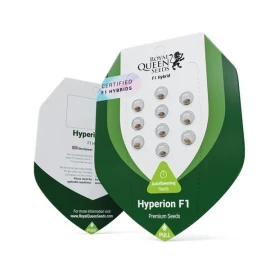Titan F1
12,00 €
At-A-Glance Product Overview
Quick Facts:
- Genetics: Blue Dream × Sugar Magnolia × Amnesia (true F1 hybrid)
- Lifecycle: 70–75 days from seed to harvest
- Height: 65–100 cm
- Yield: Indoor ~550 g/m²; Outdoor ~200 g/plant
- THC: 18–25% (some tests report up to 30%)
- Principal Terpenes: Myrcene, farnesene, ocimene, pinene, bisabolol, limonene
- Aroma Profile: Fruity, sweet, lemongrass, candy, caramel, pine, vanilla
- Disease Resistance: Enhanced resistance to bud rot (Botrytis) and powdery mildew
Best For: Home growers seeking reliability, commercial cultivators requiring uniformity, and cannabis enthusiasts pursuing potency with exceptional aromatic complexity.
Why Titan F1 Represents a Cannabis Revolution
Understanding True F1 Hybrid Technology
Titan F1 isn’t just another autoflower — it’s a breakthrough in cannabis genetics that delivers unprecedented consistency and performance through true F1 hybrid vigor.
What Makes F1 Special:
- Hybrid Vigor (Heterosis): Cross between two stable inbred lines producing enhanced growth characteristics
- Performance Boost: Up to 25% faster growth and significantly higher yields compared to standard autoflower seeds
- Uniformity: Dramatically reduced phenotype variation ensures predictable harvests
- Genetic Stability: Consistent expression of desired traits across all plants
The Science Behind Titan F1:
The breeding process combines three legendary strains through advanced genetic techniques. Blue Dream contributes balanced euphoric effects and fruity-pine aromatics, Sugar Magnolia adds sweet creamy undertones, while Amnesia delivers exceptional potency and cerebral clarity. This careful genetic orchestration results in a strain that expresses the best qualities of each parent while maintaining autoflower convenience.
Important Considerations:
- F1 seeds represent premium genetics with corresponding pricing
- Cannot be reproduced at home without access to specialized inbred parent lines
- Autoflower characteristics make cloning impractical for most growers
Chemical Profile and Effects Analysis
Cannabinoid Composition
Titan F1 consistently produces THC levels between 18–25%, with exceptional phenotypes occasionally testing higher. This potency range delivers substantial psychoactive effects while remaining manageable for experienced users. The strain may also express minor cannabinoids that contribute to the overall entourage effect.
Terpene-Driven Experience
The complex terpene profile creates a multi-layered sensory experience:
Primary Terpenes and Effects:
- Myrcene: Provides fruity, earthy base notes with relaxing properties
- Ocimene: Contributes sweet, herbal aromatics with uplifting qualities
- Pinene: Delivers pine freshness and mental clarity
- Limonene: Adds citrus brightness and mood enhancement
- Farnesene: Offers subtle floral complexity
- Bisabolol: Provides vanilla-caramel undertones with calming effects
Flavor Journey: Initial fruity candy sweetness transitions to lemongrass and herbal notes, finishing with pine and vanilla-caramel undertones that linger on the palate.
User Experience and Applications
Recreational Effects:
Fast-acting onset delivers intense physical relaxation paired with maintained mental clarity. Ideal for evening unwinding, creative sessions, or social relaxation. The balanced nature makes it versatile for various consumption preferences.
Potential Therapeutic Applications:
Users report benefits for pain management, stress relief, and sleep support. The terpene profile suggests potential for anxiety reduction and mood enhancement, though individual responses vary significantly.
Dosage Recommendations:
Start with small amounts due to high potency. New users should begin with minimal doses and gradually increase. Consider microdosing approaches for functional daytime use.
Comprehensive Cultivation Guide
Optimal Growing Environments
Environment Setup:
- Indoor: Controlled grow tents or rooms with proper ventilation
- Greenhouse: Excellent option for climate control with natural light benefits
- Outdoor: Temperate to warm climates with consistent weather patterns
- Light Schedule: 18/6 or 20/4 throughout entire lifecycle (no photoperiod changes needed)
Growing Medium Recommendations:
- Soil: Organic potting mixes for enhanced flavor development and beginner forgiveness
- Coco Coir: Excellent drainage and nutrient control for intermediate growers
- Hydroponic: Maximum growth speed and yield potential for experienced cultivators
Environmental Parameters:
- pH Targets: Soil 6.0–6.8; Coco/Hydro 5.6–6.2
- Temperature: 20–26°C during vegetative growth; 18–24°C during flowering
- Humidity: 60–70% during vegetation; 40–50% during flowering to prevent mold
Week-by-Week Growth Timeline
Weeks 0–1: Germination and Seedling Stage
Seeds typically germinate within 24–72 hours in proper conditions. Seedlings establish strong root systems and develop first true leaves. Provide gentle light and minimal nutrients.
Weeks 2–3: Early Vegetative Growth
Rapid vertical stretch begins with explosive node development. This is the optimal window for low-stress training initiation. Plants typically reach 15–25 cm with 4–6 node sets.
Weeks 4–6: Pre-Flower and Early Flowering
Massive canopy development occurs as plants transition to flowering. Continue LST adjustments and monitor for first pistil emergence. Height typically doubles during this phase.
Weeks 7–10: Full Flowering and Ripening
Dense bud formation with significant resin production. Monitor trichome development and begin flushing 7–14 days before anticipated harvest. Final height usually stabilizes.
Harvest Window: Days 70–75
Monitor trichome color (milky with some amber) and pistil maturation for optimal harvest timing. Environmental factors may slightly adjust this timeline.
Training and Plant Management
Recommended Techniques:
- Low-Stress Training (LST): Highly effective for maximizing canopy exposure and yield
- Screen of Green (SCROG): Excellent for indoor grows with height limitations
- Selective Defoliation: Light removal of large fan leaves blocking bud sites
Avoid Heavy Techniques:
Minimize topping or high-stress methods as autoflowers have limited recovery time. If topping, perform only once during early vegetative stage and only on vigorous plants.
Feeding Strategy:
Begin with mild vegetative nutrients, gradually increasing during mid-growth. Transition to bloom nutrients around week 4–5. Organic supplements help maintain terpene complexity throughout development.
Pest and Disease Management
Natural Resistance Advantages:
Titan F1 shows improved resistance to common cannabis ailments including Botrytis (bud rot) and powdery mildew compared to many standard autoflower strains.
Common Threats and Prevention:
- Spider Mites: Monitor leaf undersides; use beneficial predatory mites or neem oil treatments
- Thrips: Yellow sticky traps and beneficial insects provide effective control
- Fungal Issues: Maintain proper airflow and humidity levels; remove affected plant material immediately
Integrated Pest Management:
Implement preventive measures including beneficial insects, organic sprays, and environmental controls. Regular inspection schedules help catch problems early when treatment is most effective.
Harvest and Post-Harvest Optimization
Harvest Timing and Techniques
Harvest Indicators:
- Trichomes: 70–80% milky with 20–30% amber for balanced effects
- Pistils: 80–90% darkened and receded
- Overall Plant: Yellowing fan leaves and slowed resin production
Harvesting Process:
Cut plants at soil level during early morning hours when terpene concentration peaks. Handle gently to preserve trichome integrity and maintain aromatic compounds.
Drying and Curing Protocol
Optimal Drying Conditions:
- Temperature: 18–21°C for slow, controlled moisture removal
- Humidity: 45–55% RH to prevent mold while preserving terpenes
- Duration: 7–14 days until stems snap cleanly
- Environment: Dark, well-ventilated space with gentle air circulation
Curing Process:
Transfer dried buds to glass jars filled 75% capacity. Burp containers daily for first week, then every few days for 2–8 weeks. Proper curing dramatically enhances flavor complexity and smoothness.
Long-Term Storage:
Store cured cannabis in airtight containers away from light and heat. Consider vacuum sealing for extended storage periods. Properly cured and stored Titan F1 maintains quality for 12+ months.
Performance Metrics and Expectations
Yield Expectations
Indoor Cultivation:
Under optimized conditions with proper lighting and nutrition, expect approximately 550 g/m². This represents exceptional productivity for autoflower genetics in controlled environments.
Outdoor Cultivation:
Individual plants typically produce around 200 g when grown in suitable climates with adequate space and nutrition. Container size and environmental factors significantly influence final yields.
Height Characteristics:
Plants consistently reach 65–100 cm in height, making them suitable for discrete growing and space-limited environments while maintaining substantial production capacity.
Uniformity and Predictability
Genetic Consistency:
F1 hybrid vigor ensures minimal phenotype variation between plants. Expect consistent flowering times, similar heights, and comparable cannabinoid profiles across entire crops.
Commercial Advantages:
Reduced plant-to-plant variation eliminates time spent sorting phenotypes and enables standardized cultivation protocols. This uniformity proves invaluable for commercial operations requiring predictable outcomes.
Growth Rate Enhancement:
Independent testing suggests approximately 25% faster growth compared to standard autoflower genetics, reducing overall cultivation time while maintaining or improving final yields.
Comparative Analysis
Titan F1 vs Standard Autoflowers
Advantages:
- Superior genetic uniformity reduces cultivation variability
- Enhanced hybrid vigor increases growth speed and yield potential
- Improved disease resistance minimizes crop loss risks
- More predictable flowering times enable better harvest planning
Considerations:
- Higher seed costs require larger initial investment
- Limited breeding potential for home seed production
- Premium genetics may be unnecessary for casual growers
Titan F1 vs Photoperiod Strains
Autoflower Benefits:
- Faster total cultivation time (70–75 days vs 90–120+ days)
- No light cycle manipulation required
- Multiple harvests possible per growing season
- Smaller space requirements suitable for discrete cultivation
Photoperiod Advantages:
- Larger maximum plant sizes with extended vegetative periods
- Cloning capability for genetic preservation
- Greater training flexibility with unlimited vegetative time
- Often higher maximum yields per plant
Decision Guide by Grower Type
| Grower Type | Benefits |
|---|---|
| Home Hobbyists | Titan F1 offers reliability and quality without requiring advanced techniques |
| Commercial Cultivators | Uniformity and predictability provide significant operational advantages |
| Cannabis Enthusiasts | Premium genetics deliver exceptional potency and complex aromatics |
| Beginner Growers | Simplified growing requirements with premium results |
Purchasing Guide and Legal Considerations
Sourcing Quality Seeds
Authorized Sources:
Purchase from reputable seed banks and authorized retailers to ensure genetic authenticity. Royal Queen Seeds serves as the original breeder and primary source for verified genetics.
Pack Options and Value:
Seeds typically available in 3, 5, or 10-seed packages. Larger quantities offer better per-seed pricing but require greater initial investment. Consider testing smaller quantities before larger purchases.
Quality Indicators:
Look for suppliers offering germination guarantees, discrete packaging, and clear strain information. Established retailers typically provide better customer support and product consistency.
Legal Compliance
Important Legal Notice:
Cannabis laws vary significantly by location and jurisdiction. Research local, state, and federal regulations before purchasing or cultivating any cannabis seeds. Some regions prohibit possession, cultivation, or distribution regardless of intended use.
International Considerations:
Shipping regulations differ between countries and regions. Verify import legality and customs requirements before international seed orders.
Pre-Purchase Checklist
- Verify local cultivation legality
- Confirm growing space and equipment requirements
- Calculate total project costs including nutrients and equipment
- Research strain characteristics and growing requirements
- Select reputable seed source with customer support
Troubleshooting Common Issues
Growth-Related Problems
Slow Early Development:
- Check: pH levels, watering frequency, light intensity
- Solution: Adjust pH to optimal range, ensure proper drainage, increase light gradually
- Prevention: Use quality soil mix and monitor environmental conditions
Yellowing During Flowering:
- Check: Nutrient balance, pH lockout, natural senescence
- Solution: Flush growing medium, rebalance nutrients, verify pH
- Prevention: Maintain consistent feeding schedule and monitor plant health
Environmental Stress:
- Symptoms: Leaf curling, stunted growth, discoloration
- Causes: Temperature extremes, humidity issues, inadequate ventilation
- Solutions: Adjust environmental controls, improve air circulation, stabilize conditions
Pest and Disease Management
Bud Rot Prevention:
- Maintain humidity below 50% during flowering
- Ensure adequate air circulation around plants
- Remove any affected plant material immediately
- Monitor dense bud areas for early signs
Nutrient Deficiencies:
- Early Detection: Monitor leaf color and growth patterns
- Common Issues: Nitrogen deficiency in late vegetation, potassium deficiency in flowering
- Solutions: Adjust feeding programs, verify pH levels, consider organic supplements
Frequently Asked Questions
Is Titan F1 an autoflower or photoperiod strain?
Titan F1 is a true autoflower that begins flowering automatically based on age rather than light cycle changes. It maintains vegetative growth for approximately 3–4 weeks before transitioning to flowering.
How long does Titan F1 take from seed to harvest?
The complete lifecycle typically requires 70–75 days from germination to harvest, though environmental factors may slightly adjust this timeline.
Can I top or heavily train Titan F1?
While possible, exercise caution with high-stress techniques. Autoflowers have limited recovery time, so low-stress training methods like LST and light defoliation provide better results.
Are F1 seeds worth the premium price?
For growers prioritizing consistency, yield, and quality, F1 genetics provide excellent value through reduced variation, faster growth, and improved disease resistance.
What light schedule works best for Titan F1?
Most growers achieve excellent results with 18/6 or 20/4 light schedules throughout the entire lifecycle. Some prefer 20/4 for maximum growth potential.
How do I maximize terpene retention?
Focus on gentle drying conditions, proper curing techniques, and organic feeding programs. Avoid excessive heat during cultivation and post-harvest processing.
Can I clone Titan F1 plants?
Autoflower cloning presents significant challenges due to their determinate growth pattern. Clones typically flower immediately without developing substantial vegetative growth.
What’s the best growing medium for Titan F1?
All mediums work well, but organic soil mixes often provide the best flavor development while coco coir and hydroponic systems maximize growth speed and yields.
How does Titan F1 compare to other F1 autoflowers?
Titan F1 stands out through its unique terpene profile combining fruity, candy, and pine characteristics with exceptional potency and disease resistance.
What environmental conditions optimize Titan F1 growth?
Maintain temperatures between 20–26°C during vegetation and 18–24°C during flowering, with humidity levels of 60–70% early and 40–50% during flowering.
This comprehensive guide provides everything needed to successfully cultivate Titan F1 from seed to harvest while maximizing its exceptional genetic potential. The combination of F1 hybrid vigor, complex aromatics, and autoflower convenience makes Titan F1 an outstanding choice for cultivators seeking premium results with predictable outcomes.
Related Products
Frequently Asked Questions
Everything You Need to Know















